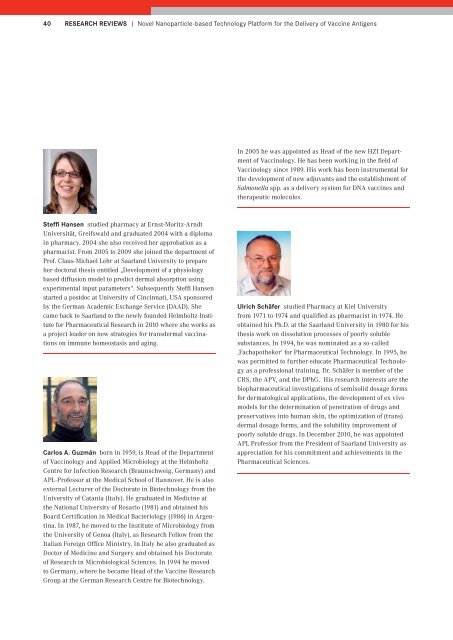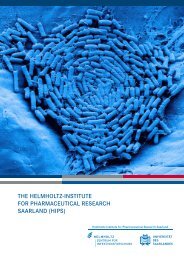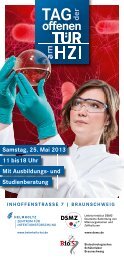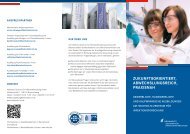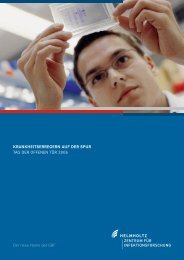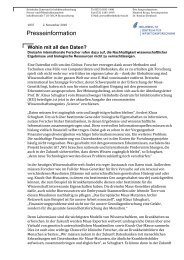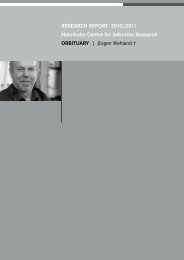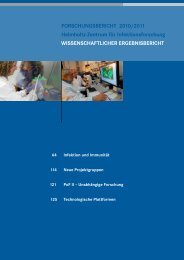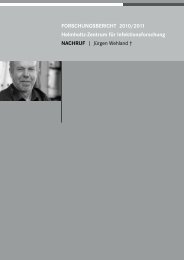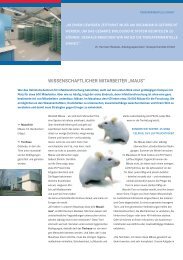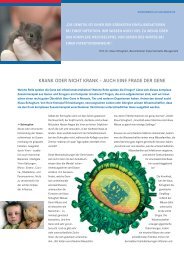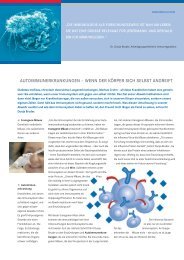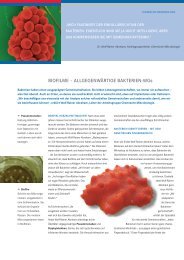Research Report 2010 2011 - Helmholtz-Zentrum für ...
Research Report 2010 2011 - Helmholtz-Zentrum für ...
Research Report 2010 2011 - Helmholtz-Zentrum für ...
Create successful ePaper yourself
Turn your PDF publications into a flip-book with our unique Google optimized e-Paper software.
40 RESEARCH REVIEWS | Novel Nanoparticle-based Technology Platform for the Delivery of Vaccine Antigens<br />
In 2005 he was appointed as Head of the new HZI Department<br />
of Vaccinology. He has been working in the field of<br />
Vaccinology since 1989. His work has been instrumental for<br />
the development of new adjuvants and the establishment of<br />
Salmonella spp. as a delivery system for DNA vaccines and<br />
therapeutic molecules.<br />
Steffi Hansen studied pharmacy at Ernst-Moritz-Arndt<br />
Universität, Greifswald and graduated 2004 with a diploma<br />
in pharmacy. 2004 she also received her approbation as a<br />
pharmacist. From 2005 to 2009 she joined the department of<br />
Prof. Claus-Michael Lehr at Saarland University to prepare<br />
her doctoral thesis entitled „Development of a physiology<br />
based diffusion model to predict dermal absorption using<br />
experimental input parameters“. Subsequently Steffi Hansen<br />
started a postdoc at University of Cincinnati, USA sponsored<br />
by the German Academic Exchange Service (DAAD). She<br />
came back to Saarland to the newly founded <strong>Helmholtz</strong>-Institute<br />
for Pharmaceutical <strong>Research</strong> in <strong>2010</strong> where she works as<br />
a project leader on new strategies for transdermal vaccinations<br />
on immune homeostasis and aging.<br />
Carlos A. Guzmán born in 1959, is Head of the Department<br />
of Vaccinology and Applied Microbiology at the <strong>Helmholtz</strong><br />
Centre for Infection <strong>Research</strong> (Braunschweig, Germany) and<br />
APL-Professor at the Medical School of Hannover. He is also<br />
external Lecturer of the Doctorate in Biotechnology from the<br />
University of Catania (Italy). He graduated in Medicine at<br />
the National University of Rosario (1981) and obtained his<br />
Board Certification in Medical Bacteriology (1986) in Argentina.<br />
In 1987, he moved to the Institute of Microbiology from<br />
the University of Genoa (Italy), as <strong>Research</strong> Fellow from the<br />
Italian Foreign Office Ministry. In Italy he also graduated as<br />
Doctor of Medicine and Surgery and obtained his Doctorate<br />
of <strong>Research</strong> in Microbiological Sciences. In 1994 he moved<br />
to Germany, where he became Head of the Vaccine <strong>Research</strong><br />
Group at the German <strong>Research</strong> Centre for Biotechnology.<br />
Ulrich Schäfer studied Pharmacy at Kiel University<br />
from 1971 to 1974 and qualified as pharmacist in 1974. He<br />
obtained his Ph.D. at the Saarland University in 1980 for his<br />
thesis work on dissolution processes of poorly soluble<br />
substances. In 1994, he was nominated as a so-called<br />
‚Fachapotheker‘ for Pharmaceutical Technology. In 1995, he<br />
was permitted to further educate Pharmaceutical Technology<br />
as a professional training. Dr. Schäfer is member of the<br />
CRS, the APV, and the DPhG. His research interests are the<br />
biopharmaceutical investigations of semisolid dosage forms<br />
for dermatological applications, the development of ex vivo<br />
models for the determination of penetration of drugs and<br />
preservatives into human skin, the optimization of (trans)<br />
dermal dosage forms, and the solubility improvement of<br />
poorly soluble drugs. In December <strong>2010</strong>, he was appointed<br />
APL Professor from the President of Saarland University as<br />
appreciation for his commitment and achievements in the<br />
Pharmaceutical Sciences.


